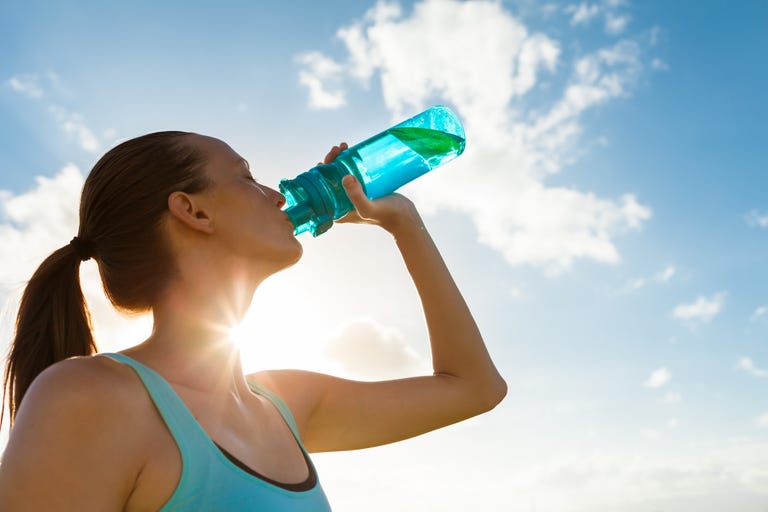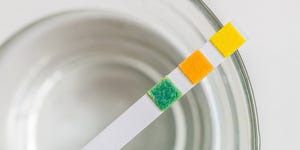

There’s no question the health food world is full of marketing ploys and one-hit-wonder food trends (whatever happened to cloud bread?). But amid all the noise, one wellness rule is tried-and-true: Water is good for you, and you should drink more of it.
Or so I thought. Lately, I’ve heard claims that you should only drink something called alkaline water to be better hydrated during your workout. And I’ve started seeing it at the grocery store (and in stories about celebrity wellness routines). Could this high-pH H2O live up to the hype? I went to the experts to clear things up.
Time for the “basics”: What is alkaline water?
First, let’s take a trip back to high school chemistry class. Remember acids and bases? Their strength is measured using something called the pH scale. “The pH scale ranges from 0 to 14, 0 being the most acidic and 14 being the most alkaline (or basic),” explains Lisa Hayim, R.D., & founder of The Well Necessities. The human body has a natural pH of about 7.4, and regular water has a pH of about 7—right in the middle.
“It’s the job of the lungs, liver, and kidneys to maintain a normal pH in our bodies.”
Enter alkaline water, which is rich in alkalizing ingredients like calcium, silica, potassium, magnesium, and bicarbonate, explains Amy Shapiro, R.D., founder of Real Nutrition NYC. With a pH around 8 or 9, aklaline water is less acidic and more basic than regular water.
You can find alkaline water in bottled form, or you can DIY by using a water ionizer (although they do NOT come cheap—this one on Amazon costs over $1,500!).
Are there any real alkaline water benefits?
“The theory is that by drinking alkaline-enhanced water, you can keep your pH from being too low and therefore too acidic,” Shapiro says—making the water serve as kind of a counterbalance to your body’s acidity levels.
As a result, proponents claim that you’ll enjoy health and hydration benefits, particularly since the water also includes essential minerals like calcium, potassium, sodium, and magnesium.

And a few of these claims do have some merit. One 2012 study showed that alkaline water with a pH of 8.8 may deactivate the acid pepsin, which could be useful in the treatment of acid reflux disease, Shapiro points out.
However, this was an in vitro study—meaning it wasn’t done on humans, just in a petri dish. So it’s not clear how those effects could play out IRL.
One small study also found that drinking a mineral-based alkaline water may improve hydration status in healthy adults more than drinking regular water—in the short-term. But this only looked at 38 people, which is not at all a representative sample size.
A 2016 study on 100 adults also showed that drinking alkaline water may help blood flow through the body more easily post-exercise to deliver oxygen to your muscles, Shapiro says.
But all of these studies are small and have serious limitations—so take their findings with a grain of acid-fighting sodium.
Is alkaline water actually legit?
Here’s the catch: Your body is already pretty damn good at controlling its pH levels. “It’s the job of the lungs, liver, and kidneys to maintain a normal pH in our bodies,” says Keri Gans, a registered dietitian nutritionist in NYC. So drinking a fancy water to “balance” things out is kind of pointless because a healthy body is already doing that by itself.
And if you’re drinking it to correct any health issues (like acid reflux), welp, sorry to break it to you, but there’s probably an underlying cause that you should address with your doctor before turning to alkaline water, Gans says.
Should you even drink alkaline water?
Gans says alkaline water has no proven benefits, but isn’t necessarily bad for the average person. However, it’s not completely risk-free. Alkaline water can actually be dangerous for people with certain health conditions, such as kidney disease, Gans notes.
And there are some risks even for healthy people. “Too much alkaline water may reduce the amount of stomach acid in the body, which is important for digestion and also to prevent certain illnesses,” Shapiro says.

In some rare cases, going overboard on the water could lead to a state called alkalosis, which has symptoms such as nausea, vomiting, tremors, muscle twitches, and confusion. “This may also cause calcium to leach from the bones, leading to osteoporosis,” Shapiro says.
The most important thing to focus on here is drinking more water in general. “If a bottle of fancy water helps you do that, then one here and there can’t hurt,” Shapiro says.
The bottom line: Don’t waste your $$. Regular water is way better, and doesn’t come with scary potential side-effects.
Source: Read Full Article